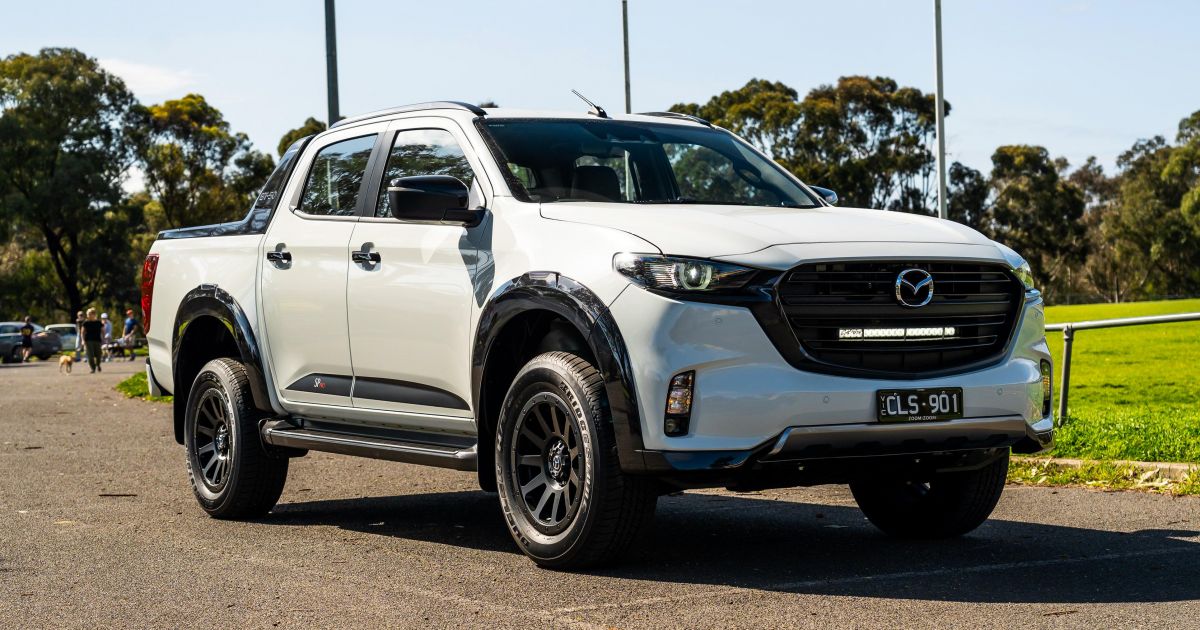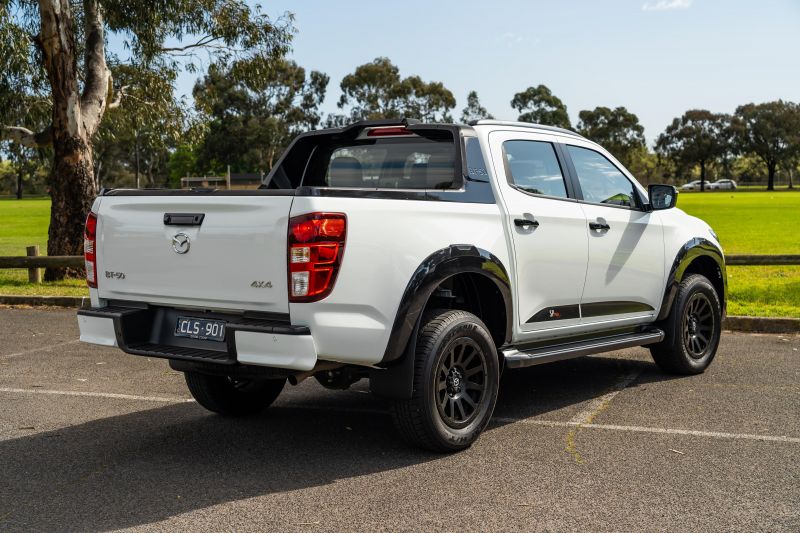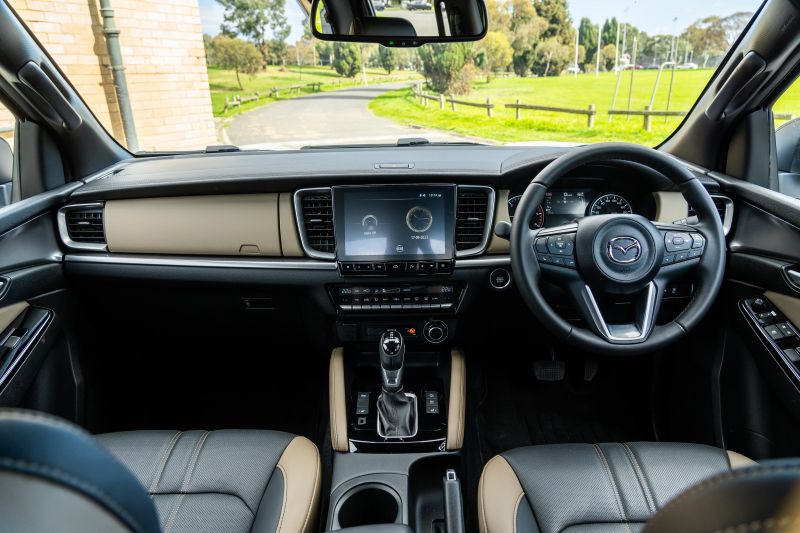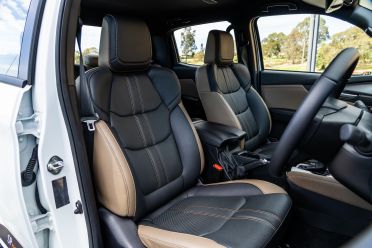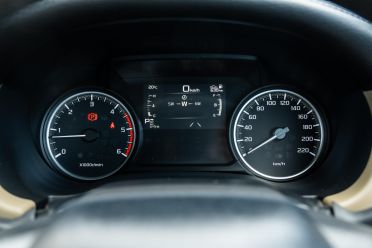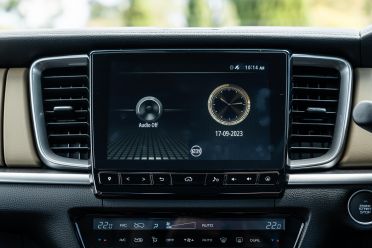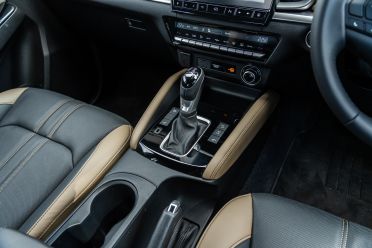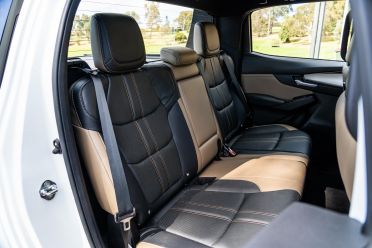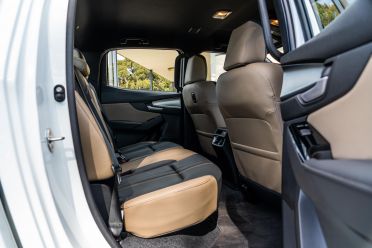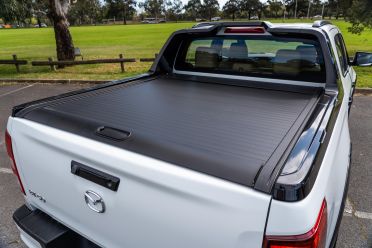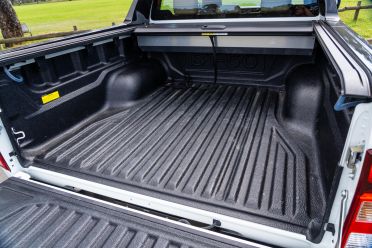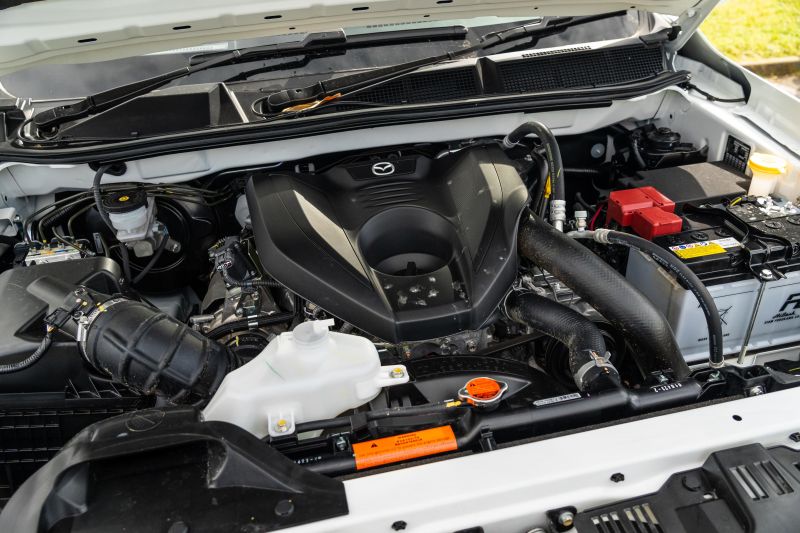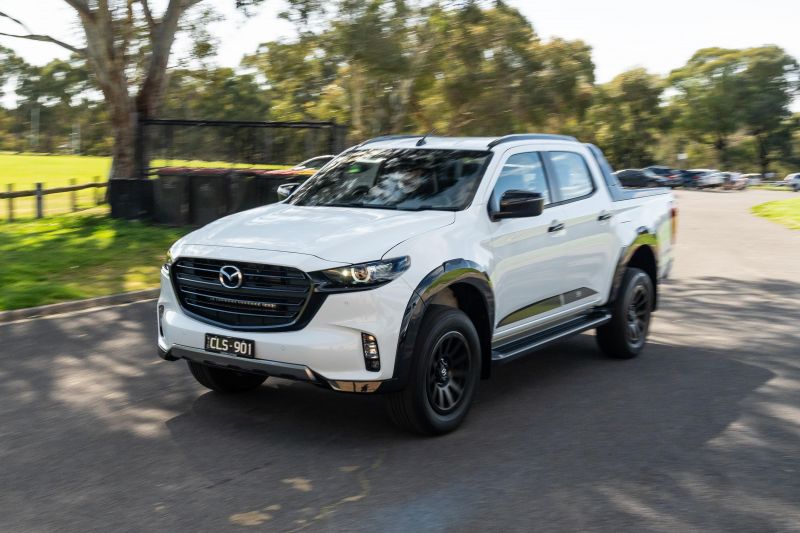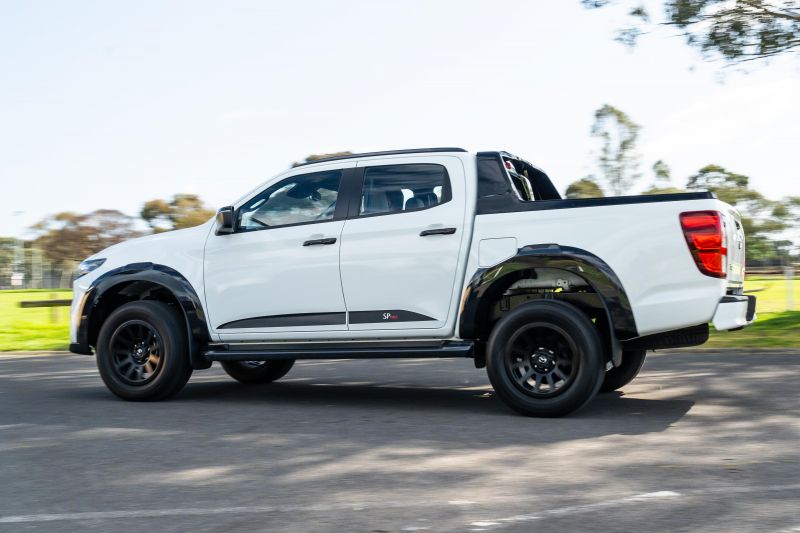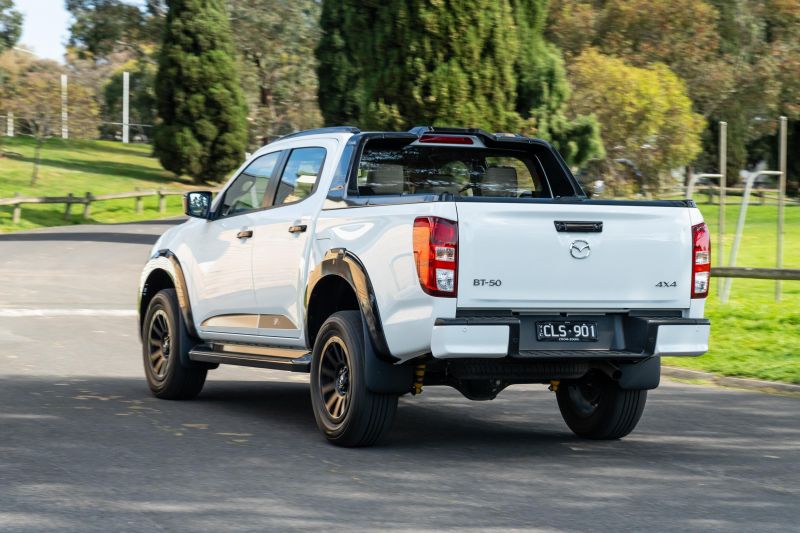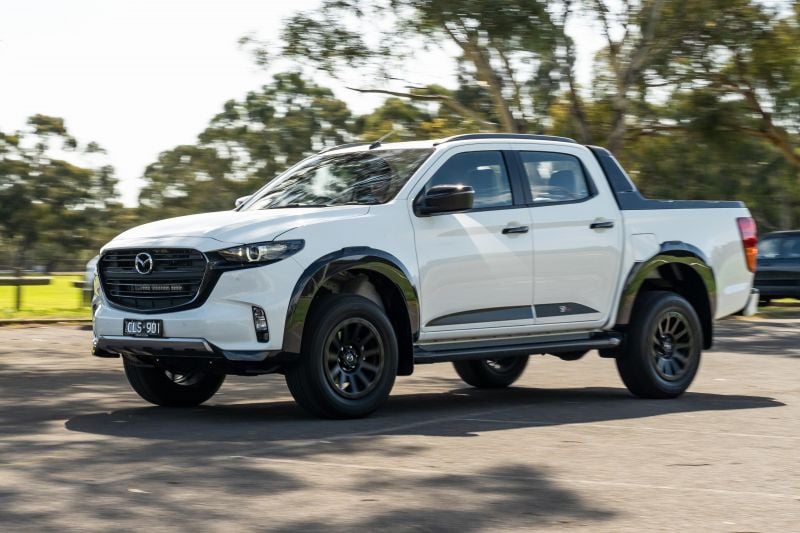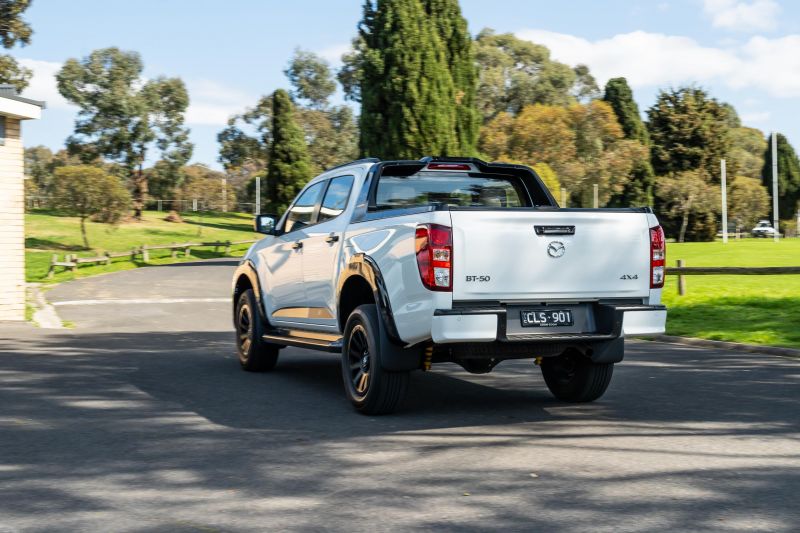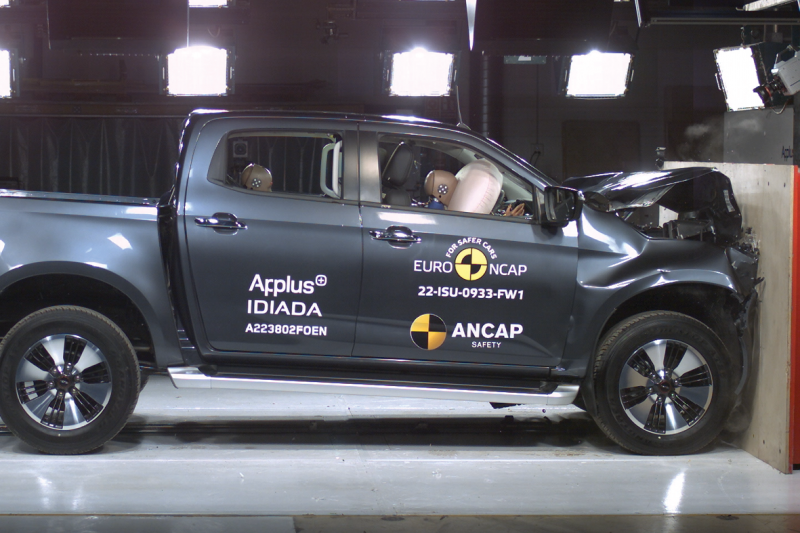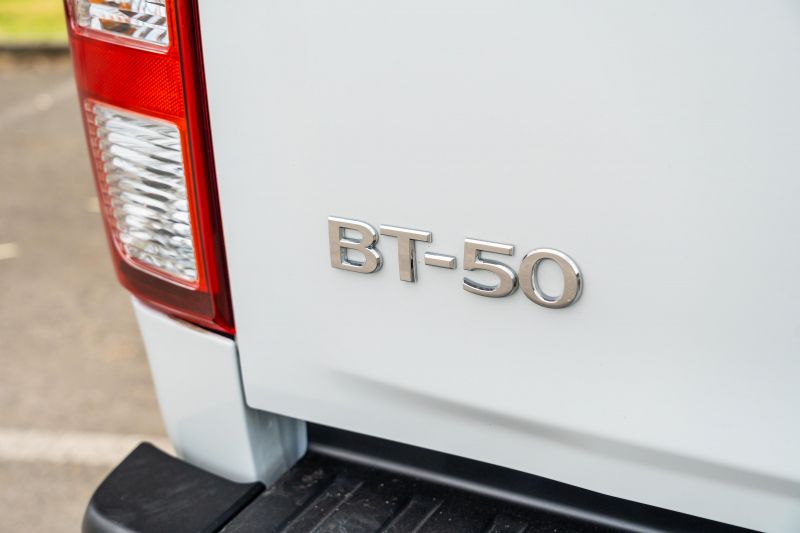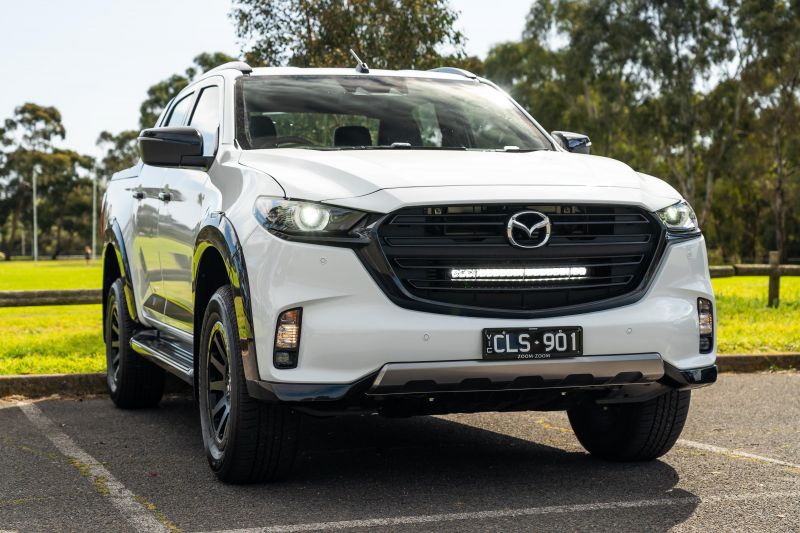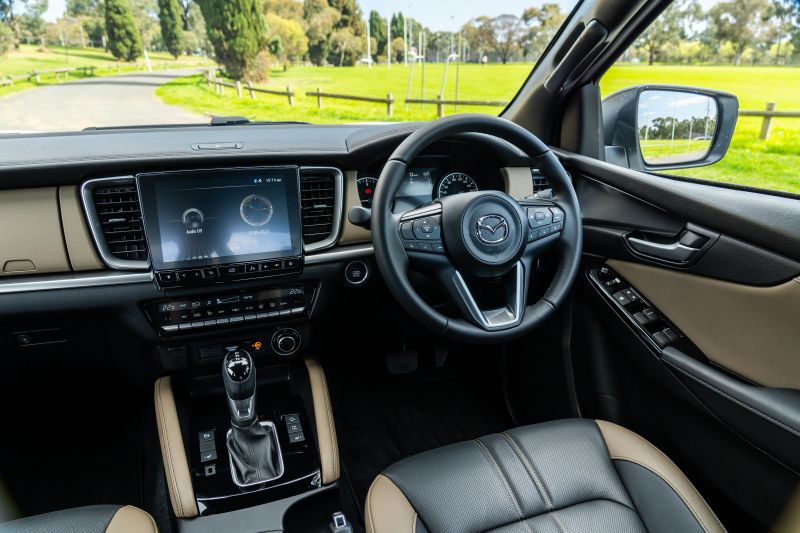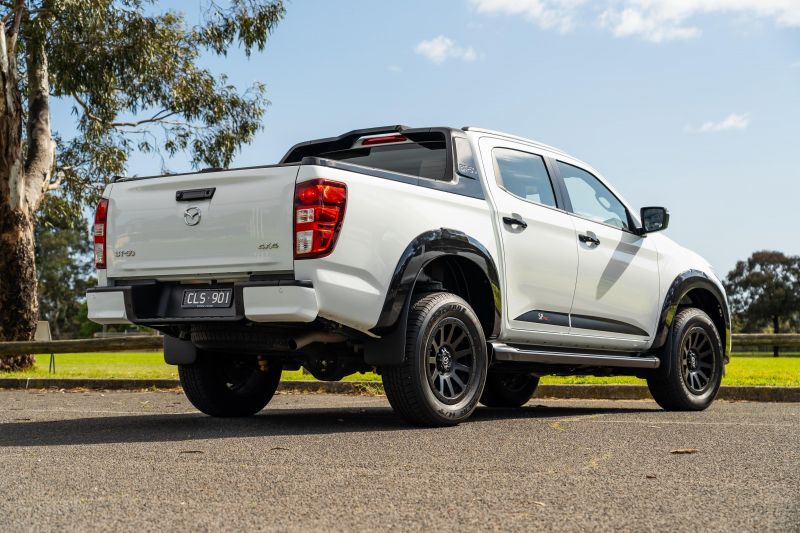The current-generation Mazda BT-50 has been on sale locally for three years now; that’s long enough to see the dual-cab ute segment move on.
Based on the Isuzu D-Max, the BT-50 is pitched as a slightly more plush lifestyle-oriented ute. Despite this it doesn’t compromise on any key ute attributes such as towing and payload.
On test here is the BT-50 SP, which is second from the top of the range. Our vehicle came with the recently introduced SP Pro package.
This $7668 optional package adds special 18-inch alloy wheels, Nitrocharger suspension with a 40mm lift, Lightforce LED light bar, and SP Pro decals.
Is this the ultimate BT-50? Read along to find out.
How does the Mazda BT-50 fare vs its competitors?
View a detailed breakdown of the Mazda BT-50 against similarly sized vehicles.

Mazda
BT-50
How much does the Mazda BT-50 cost?
4×2
- 2023 Mazda BT-50 XS single-cab chassis 1.9 auto: $35,370
- 2023 Mazda BT-50 XT single-cab chassis 3.0 auto: $38,370
- 2023 Mazda BT-50 XS dual-cab pickup 1.9 auto: $44,310
- 2023 Mazda BT-50 XT Freestyle cab-chassis 3.0 auto: $41,870
- 2023 Mazda BT-50 XT dual-cab chassis 3.0 auto: $45,910
- 2023 Mazda BT-50 XT dual-cab pickup 3.0 auto: $47,310
- 2023 Mazda BT-50 XTR dual-cab pickup 3.0 auto: $51,390
4×4
- 2023 Mazda BT-50 XT single-cab chassis 3.0 manual: $43,370
- 2023 Mazda BT-50 XT single-cab chassis 3.0 auto: $45,870
- 2023 Mazda BT-50 XT Freestyle cab-chassis 3.0 manual: $46,870
- 2023 Mazda BT-50 XT Freestyle cab-chassis 3.0 auto: $49,370
- 2023 Mazda BT-50 XT dual-cab chassis 3.0 manual: $51,180
- 2023 Mazda BT-50 XT dual-cab pickup 3.0 manual: $52,580
- 2023 Mazda BT-50 XS dual-cab pickup 1.9 auto: $52,930
- 2023 Mazda BT-50 XT dual-cab chassis 3.0 auto: $53,680)
- 2023 Mazda BT-50 XT dual-cab pickup 3.0 auto: $55,080
- 2023 Mazda BT-50 XTR dual-cab pickup 3.0 manual: $56,630
- 2023 Mazda BT-50 XTR dual-cab chassis 3.0 auto: $57,730
- 2023 Mazda BT-50 XTR dual-cab pickup 3.0 auto: $59,130
- 2023 Mazda BT-50 GT dual-cab pickup 3.0 auto: $62,510
- 2023 Mazda BT-50 LE dual-cab pickup 3.0 auto: $64,295
- 2023 Mazda BT-50 SP dual-cab pickup 3.0 auto: $68,510
- 2023 Mazda BT-50 Thunder dual-cab pickup 3.0 auto: $73,945
All prices are before on-road costs
The SP Pro enhancement pack costs an additional $7668 and adds the following:
- 18-inch alloy wheels
- Nitrocharger suspension upgrade kit (40mm lift)
- Lightforce LED light bar
- SP Pro decals
To see how the BT-50 compares to its rivals, line it up side-by-side with any car you want using our comparison tool.
What is the Mazda BT-50 like on the inside?
Hopping into the Mazda BT-50 SP with the optional SP Pro package is a little more difficult than the regular model, mostly due to the 40mm lift its Nitrocharger suspension upgrade kit brings.
There are thankfully side steps and grab handles to make getting in and out a bit easier. Regardless, I found I needed two scoots in order to get comfortable in the driver’s seat.
Speaking of the driver’s seat, the BT-50 SP comes with really cool-looking seats that are finished in black and brown synthetic leather. They look a lot more flash than the typical all-black seats in a large number of its rivals.
The driver’s seat has eight ways of electric adjustability, as well as adjustable lumbar support. My favourite part of the driver’s seat was its decent level of thigh support.
Ahead of the driver is a steering wheel that’s wrapped in buttery soft leather. It’s a lot of smoother than quite a number of its ute competitors. All the buttons on the steering wheel have a tactile click, adding to the feeling of quality.
Behind the steering wheel are a set of traditional analogue dials and a small 4.2-inch digital instrument cluster which tells you all you need to know.
You can get lost quite easily in the trip meter’s settings, as it feels like there’s an option for everything. It’s nice to have configurability but surely there’s only so much you can do with a 4.2-inch screen.
The 9.0-inch touchscreen infotainment system is standard on almost all BT-50 variants, and also features on the related Isuzu D-Max and MU-X.
The screen itself is good to look at with its matte finish, but picks up fingerprints and reflections like nothing else. The native user interface is also really dark for the most part, which amplifies these imperfections.
It doesn’t appear to have very much processing power, which means it takes a while to turn on upon startup and also when loading new pages.
One of the most frustrating waits is for smartphone mirroring to start up. The BT-50 SP comes with wireless and wired Apple CarPlay. Android Auto on the other hand is only available in wired form.
I experienced a number of wireless Apple CarPlay dropouts. When this happens it feels like an eternity passes before it reconnects, relative to other systems. I spent the majority of this time prodding the touchscreen to no avail.
There’s no wireless phone charger, which means you need to be careful (when connected to wireless Apple CarPlay) that you don’t run out of battery. There is a generous space to store you phone ahead of the gear selector though.
Like the seats, the dashboard has a brown and black two-tone finish. It’s largely covered in a soft, padded leather-looking material. It’s quite plush; although, you don’t have to look far to find harder-wearing plastics.
On the centre console there’s a fair bit of piano black, which gets scratched really easily, and can get smudgy gross after just a week.
The cupholders in the centre console are two different shapes – and so deep a coffee cup gets swallowed completely. There are no ‘teeth’ in them to hold bottles securely.
Moving to the second row, it’s not perfect for adults on long trips but kids will be fine. At a leggy 182cm, my knees rested firmly against the seat in front, and I had just enough headroom. All the main touch points in the second row are still soft and spongey; though, it’s easier to find harder plastics.
Second-row amenities include a handy hook on the backrest of the front passenger’s seat, air vents, and a USB port. There are a number of grab handles to assist in getting in and out.
The tub on the BT-50 SP measures in at 1571mm long, 1530mm wide, and 490mm tall. Between the arches is 1120mm. There’s a spray-in tubliner, a manual tonneau cover and gloss black sail plane sports bar as standard.
The tailgate itself is extremely heavy as it’s not assisted by any kind of strut or torsion bar as standard. It’s also not part of central locking, which means when you lock the ute you need to manually lock the tailgate.
If you didn’t know the tailgate wasn’t included in the central locking and you left something of value in the tub, it could get stolen very easily. As it turns out, this is quite common in the dual-cab segment.
What’s under the bonnet?
| Mazda BT-50 SP | |
|---|---|
| Engine | 3.0-litre 4cyl turbo-diesel |
| Power | 140kW |
| Torque | 450Nm |
| Transmission | 6-speed automatic |
| Driven Wheels | Part-time four-wheel drive |
| Weight | 2208kg (kerb) |
| Fuel economy (claimed) | 8.0 litres per 100km |
| Fuel economy (as tested) | 9.2 litres per 100km |
| Fuel tank | 76 litres |
| Braked towing capacity | 3500kg |
| Unbraked towing capacity | 750kg |
| Payload | 892kg |
| Gross vehicle mass (GVM) | 3100kg |
| Gross combination mass (GCM) | 6000kg |
To see how the BT-50 compares to its rivals, line it up side-by-side with any car you want using our comparison tool.
How does the Mazda BT-50 drive?
Starting up the BT-50 SP you’re greeted with a diesel engine clatter that’s instantly recognisable and teleports me back to being on the farm.
The idle can be loud and gruff before the engine warms up to its proper operating temperature, which is common among work-oriented dual-cab utes.
When the ute is completely unladen the engine feels quite strong. From 0-30km/h it’s pretty quick and you’ll be keep up with the majority of city traffic from the lights.
This sense of speed doesn’t last long though, as from 30km/h and above the engine has to work a lot harder to pick up momentum. If you really push it the engine gets quite loud and revs hard, which can be grating but is common with a number four-cylinder turbo-diesel utes.
I found the Aisin-sourced six-speed automatic in the BT-50 to be quite slick under light loads. There’s no need to push the engine as peak torque comes on tap from 1600rpm.
The steering in the BT-50 is light in low-speed scenarios and makes you feel like you’re driving something a lot smaller than it is. Despite this you still have to twirl the steering wheel a fair bit to get the ute to change directions.
There’s also no getting around how large the BT-50 is, which can make it a bit of a pain to park. There are front and rear parking sensors, as well as a reversing camera which has adequate picture quality.
Around town the BT-50 SP’s ute roots shine through. It gets a bit of a rock happening when shifting from reverse to drive, or when going over sharp bumps.
Speaking of harsh bumps, the Nitrocharger suspension upgrade that forms part of the optional SP Pro package equipped to our tester, did in fact iron out a fair bit of the harshness I’ve experienced in other BT-50s.
Despite this it’s still a little rough when going over speed bumps, especially at the rear. That’s one downside of leaf suspension, which is geared more towards load carrying than on-road comfort.
The Nitrocharger suspension kit brings a 40mm suspension lift, as well as a 12mm track increase.
Dialling up the speed in the BT-50 SP takes a bit of work. You’ll find the revs tend to hang between 2500 and 3000rpm during these times.
You feel a lot of the metropolitan road bumps at higher speeds and it can get a little unsettled at points. This would likely sort itself out with a bit of weight in the tub.
Once you get out on the highway or freeway the BT-50 SP with the SP Pro package comes into its element. The transmission clicks into top gear and the engine finds a nice groove at around 1500rpm.
Despite being able to cruise along at 100-110km/h on the freeway it doesn’t really feel like the ute has anything more to give. This means you’ll really need to plan your overtakes so you don’t get caught out.
On the safety front, the BT-50’s adaptive cruise control system mostly works as intended. It’s very easy to activate via the steering wheel controls and can be clearly seen on the small digital instrument cluster.
It reacts to other cars quite naturally and appropriately; if another car pulls in ahead of you it doesn’t instantly slam on the brakes and instead allows it to pull away gradually.
The lane-centring system can be a little annoying as it bounces the ute around the lane and gets confused easily when the lane markings fade. It’s best suited for clearly marked highways and freeways.
You can also switch all of the lane-keeping and lane-centring functions off very easily with buttons on the steering wheel.
The last thing I’ll mention in this section is the LED headlights in this vehicle are great. This is helped by the Lightforce LED light bar that’s cleverly installed behind the grille.
The only thing that lets this ute down in the lighting department are that the front fog lights are halogen. This looks really strange when compared to all the other LED units.
What do you get?
BT-50 XS + XT highlights:
- 7.0-inch touchscreen infotainment system
- Wired Android Auto
- Wireless Apple CarPlay
- DAB+ digital radio
- 4.2-inch instrument cluster screen
- Cloth upholstery
- Carpeted floors
- Air-conditioning
- Power windows
- Cruise control (manual models) or adaptive cruise control with Stop & Go (automatic models)
- Reversing camera
- LED headlights
- Rain-sensing wipers
- Automatic headlights
- Automatic high-beam
- 17-inch wheels (alloy on XT)
BT-50 XTR gains:
- 9.0-inch touchscreen infotainment system
- Satellite navigation
- Dual-zone climate control
- Rear air vents
- Leather-wrapped steering wheel and shifter
- Auto-dimming interior mirror
- Rear seat centre armrest
- Power-folding exterior mirrors
- Keyless entry and start
- Tyre pressure monitoring (NEW)
- LED headlights with auto levelling
- LED front fog lights and daytime running lights
- Side steps
- 18-inch alloy wheels
BT-50 LE gains:
- Single hooped polished alloy bull bar
- Polished sports bar with integrated brake light
- Heavy-duty tub liner
BT-50 GT gains:
- Brown leather upholstery
- Eight-way power driver’s seat
- Heated front seats
- Remote engine start (automatic only)
- Front parking sensors
- Heated chrome exterior mirrors
BT-50 SP adds:
- Dark grey roof rails
- Black grille
- Glossy black exterior mirrors
- Gloss black door handles
- Black 18-inch alloy wheels
- Dark grey side steps
- ‘Driftwood’ leather and black synthetic suede trim
- Manually-operated black roller tonneau cover
- Tub liner
- Gloss black sail-plane sport bar
- Front bumper lower decoration trim
- Gloss black wheel flares
The $7668 SP Pro enhancement pack adds:
- 18-inch alloy wheels
- Nitrocharger suspension upgrade kit (40mm lift)
- Lightforce LED light bar
- SP Pro decals
Is the Mazda BT-50 safe?
The Mazda BT-50 wears a five-star ANCAP safety rating with a 2022 date stamp, based on tests conducted on the related Isuzu D-Max. This rating applies to all variants bar the BT-50 Thunder.
The utes were reassessed despite having already received five-star ratings in 2020, as the D-Max and BT-50 received a design change to the driver’s knee airbag and instrument panel.
The BT-50 received scores of 86 per cent for adult occupant protection, 89 per cent for child occupant protection, 67 per cent for vulnerable road user protection and 84 per cent for safety assist.
It’s worth noting the BT-50’s unique front end, compared to its Isuzu twin, garnered a slightly weaker pedestrian protection score (from 69 per cent).
All Mazda BT-50 models come standard with the following safety features:
- Autonomous emergency braking
- Blind-spot monitoring
- Lane departure warning
- Rear cross-traffic alert
- Turn assist
- Driver attention monitoring
- Front, front-side and curtain airbags
- Driver’s knee airbag
- Front-centre airbag
- Traffic sign recognition
Automatic models also feature lane-keep assist and adaptive cruise control.
How much does the Mazda BT-50 cost to run?
The Mazda BT-50 is covered by a five-year, unlimited-kilometre warranty with roadside assistance for the same period.
Logbook servicing is required every 12 months or 15,000km, whichever comes first. The first five services with the BT-50 SP are capped at $449, $416, $713, $531 and $334, respectively. This equals $2443 over a period of five years.
If you purchase the SP Pro accessory pack as part of the new BT-50 SP and have it installed prior to delivery it’s covered by the same five-year, unlimited-kilometre warranty as the ute itself. If it’s fitted after delivery it’s covered by a two-year warranty.
CarExpert’s Take on the Mazda BT-50
The current Mazda BT-50 is getting a little long in tooth now, but it still forms a strong alternative to the Ford Ranger and Toyota HiLux.
In almost top-spec BT-50 SP trim on test here, the ute looks quite SUV-like inside and out, has some soft interior touches, and has the ability to be used as a work ute or as a lifestyle vehicle.
Despite this the ute is still rather expensive for what it offers. This is before you add the near-$8000 SP Pro pack fitted to this vehicle, which brings the total asking price to over $76,000 before on-roads.
Sure, the price tag for the SP Pro pack is the fitted price and is covered with the full five-year, unlimited-kilometre warranty if included as part of the ute purchase, but it only includes an upgraded suspension kit, LED light bar, special 18-inch alloy wheels and decals.
Also, if you don’t want a certain part of the SP Pro pack you’d have to purchase each accessory separately.
I’d argue if you really love the look of the Mazda BT-50 SP with the SP Pro pack and are willing to pay more than the asking price of a Ford Ranger Wildtrak V6, then go for it!
If you don’t; however, and are still wanting a BT-50 I’d steer you towards the more conservatively styled GT variant if you intend to use the ute as a lifestyle vehicle, or the mid-spec XTR if you don’t want all the bells and whistles.
Click the images for the full gallery
BUY: Mazda BT-50
MORE: Everything Mazda BT-50

